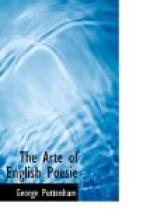Francis Petrarcha. The Lord
Vaux
his commendation lyeth chiefly in the facillitie of
his meetre, and the aptnesse of his descriptions such
as he taketh vpon him to make, namely in sundry of
his Songs, wherein he sheweth the counterfait action
very liuely & pleasantly. Of the later sort I
thinke thus. That for Tragedie, the Lord of Buckhurst,
& Maister
Edward Ferrys for such doings as I
haue sene of theirs do deserue the hyest price:
Th’Earle of Oxford and Maister
Edwardes
of her Maiesties Chappell for Comedy and Enterlude.
For Eglogue and pastorall Poesie, Sir
Philip Sydney
and Maister
Challenner, and that other Gentleman
who wrate the late shepheardes Callender. For
dittie and amourous
Ode I finde Sir
Walter
Rawleyghs vayne most loftie, insolent, and passionate.
Maister
Edward Dyar, for Elegie most sweete,
solempne and of high conceit.
Gascon for a
good meeter and for a plentifull vayne.
Phaer
and
Golding for a learned and well corrected
verse, specially in translation cleare and very faithfuly
answering their authours intent. Others haue
also written with much facillitie, but more commendably
perchance if they had not written so much nor so popularly.
But last in recitall and first in degree is the Queene
our soueraigne Lady, whose learned, delicate, noble
Muse, easily surmounteth all the rest that haue written
before her time or since, for sence, sweetnesse and
subtillitie, be it in Ode, Elegie, Epigram, or any
other kinde of poeme Heroick or Lyricke, wherein it
shall please her Maiestie to employ her penne, euen
by as much oddes as her owne excellent estate and degree
exceedeth all the rest of her most humble vassalls.
THE SECOND BOOKE,
OF PROPORTION POETICAL.
CHAP. I.
Of Proportion Poeticall.
It is said by such as professe the Mathematicall sciences,
that all things stand by proportion, and that without
it nothing could stand to be good or beautiful.
The Doctors of our Theologie to the same effect, but
in other termes, say: that God made the world
by number, measure and weight: some for weight
say tune; and peraduenture better. For weight
is a kind of measure or of much conueniencie with
it: and therefore in their descriptions be alwayes
coupled together (statica & metrica) weight
and measures. Hereupon it seemeth the Philosopher
gathers a triple proportion, to wit, the Arithmeticall,
the Geometricall, and the Musical. And by one
of these three is euery other proportion guided of
the things that haue conueniencie by relation, as
the visible by light colour and shadow: the audible
by stirres, times and accents: the odorable by
smelles of sundry temperaments: the tastible
by sauours to the rate: the tangible by his obiectes
in this or that regard. Of all which we leaue
to speake, returning to our poeticall proportion,
which holdeth of the Musical, because as we sayd before




